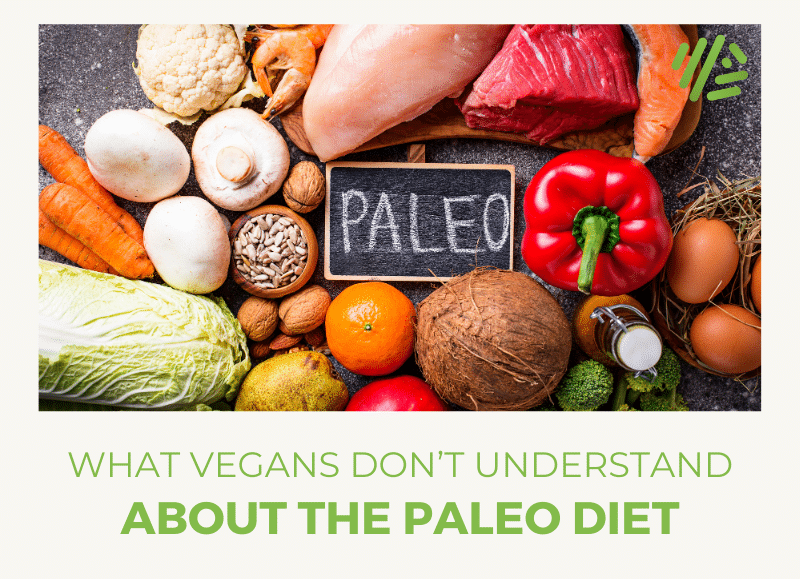What Vegans Don’t Understand About the Paleo Diet
Article at a Glance
- Many of the Epidemiological studies advanced in favor of a Vegan diet actually support a diet that is higher in plant protein, but not exclusively plant protein.
- Some with autoimmune conditions linked to poor gut health may not be able to follow a Vegan diet while their gut heals.
- An excess of carbohydrates can feed pathogenic bacteria and yeast, which is why Paleo is popular, it starves the bad guys in the gut of their fuel source.

Contents
Most Vegans don’t see a good reason why anyone would ever go Paleo, under any circumstances.
After all, as documentaries like What the Health claim, the science is squarely on the Vegan side of the aisle.
Or is it?
Is there something the Vegan community is missing about the popularity of Paleo?
Although I am a plant based guy myself, I think many in the Vegan world have a big blind spot for legitimate reasons why a Paleo diet can work, especially when the goal is to heal the gut, and especially in the short term.
See: the Vegan guide to dietary supplements
The Vegan studies that aren’t really Vegan studies
While I do believe the plant based community has the better science on its side overall, Veganism isn’t as proven as some claim. As we touched on in a previous post, one of the main Harvard studies Vegans point to to claim that plant based diets increase lifespan doesn’t say exactly that.
What the study, titled Association of Animal and Plant Protein Intake With All-Cause and Cause-Specific Mortality, says is that those with a chronic condition or a lifestyle risk factor (such as drinking or obesity) have a lower chance of mortality from all causes when they adopt a diet that is higher in plant protein, but not exclusively plant protein. The study looked at segments of larger studies over an 18 month period. In that time, participants weren’t necessarily “vegan” or “vegetarian,” instead they were given surveys asking how much animal and plant protein they consumed on a given day / week / month. Many of the participants who ate more plant protein than animal protein still ate animal protein during the 18 months. To quote the study: “animal and plant protein intake was assessed by regularly updated validated food frequency questionnaires.” The data was assembled on a spectrum of percentage of protein intake comprised of plant sources, not by looking at the health of Vegans in isolation.
Despite the fact that there is some nuance to this Harvard study, and others like it, the Vegan community, and especially Vegan advocates like Rich Roll, routinely refer to a “mountain of science” in support of an exclusively Vegan lifestyle. I really like Rich Roll, and I listen to his podcast, but the constant befuddlement over the popularity of Paleo (as if there is no reason someone would ever adopt a low carbohydrate diet) inspired this post.
You can be plant based and still understand there are sound reasons for temporarily following a Paleo diet, and no diet has every study on its side.
Low carb diets and gut health
The thing Vegans don’t seem to get about the Paleo diet is that some people with gut issues feel great on a Paleo diet because they effectively starve pathogenic bacteria and yeast that are giving their gut a hard time. There is a crisis with gut health in the U.S., and reducing carbs is one way to beat back some of the bad bacteria that can take over the gut. (R)
Grains provide a good example. They cause inflammation and autoimmunity in some people. If you can’t eat grains, and you may not be able to when your microbiome is out of balance, it is close to impossible to get adequate nutrition on a Vegan diet. In fact, some people are sensitive to the lectins and mold toxins found in grains under any circumstances. The obvious case is with celiac disease, where eating wheat triggers an autoimmune reaction. However, it’s important to point out that sensitivity to grains doesn’t stop with wheat.
It doesn’t even stop with humans.
Grain makes animals sick
Vegans love to use the example of gorillas as the poster child for the effectiveness of plant protein at building muscle.
But what about cows and grain?
Part of the nightmare that is the industrial farming system is that animals, like cows, who have no ability to digest grain, are force fed loads and loads of grain in the form of cheap, GMO corn. Because the cow’s stomach is designed for grass, corn is an assault on the system, and over time the animal becomes ill. In fact, it’s the grain feed that is responsible for cows developing nasty bugs like E. Coli in their intestinal tract. (R) Grain fed cows develop acid resistant strains of E. Coli that are a threat to humans.
In addition to being undigestible by cows, one of the major culprits that cause disease in animals fed grain is mycotoxin. Part of the advantage of grain is that it can be grown and stored in bulk for extended periods of time. The downside is that grains get moldy while they sit in silos. The molds that grow in grain, called mycotoxins, release toxins that make people and animals ill. For example, the government of Manitoba’s website discusses the impact of mycotoxins on the health of livestock. The moldier the grain, the worse the health of cattle and other farm animals, with many calves lost to mycotoxin.
Plausibly, humans can have similar reactions to mold toxins in grains that the cattle in Manitoba do. And sadly, we know that the U.S. has a problem with mycotoxins in its grain stores. (R) (R) For example, trace amounts of Ochratoxin A have been found in corn cereals. (R)
Grain is food for bad guys in the gut
In addition to the toxin found in grain, grain is also high glycemic, meaning it converts into sugar in the body. This is especially true with refined grains. These high sugar grain products alter the composition of the microbiome by feeding bad microbes in the gut. For example, not only does wheat increase zonulin production, which is responsible for breaking apart the lining of the gut wall, it feeds Candida and other pathogenic yeast.
If your gut health is damaged, as it is with so many people who have autoimmune conditions, taking a break from grains means stopping the bad guy’s food source. In Mold and Mycotoxins by Dr. Neil Nathan, one of the detox protocols Dr. Nathan calls for for to detoxify from mold, is a low amylose diet. Amylose is a carbohydrate source that converts into sugar, which in turn feeds mold and yeast. Dr. Nathan recommends less than 100g of carbs a day while detoxing.
Similarly, many who suffer from lyme disease swear by a low carb diet as a way of keeping their lyme in check.
See also: The dietary intake of wheat and cereal grains and their role in inflammation
And this is where the popularity of Paleo comes in.
Although it may not be a great long term solution for many, especially when the diet involves an excess of protein, going Paleo gives people with autoimmune conditions linked to the gut a chance to heal.
Why Paleo is popular
So, in essence, my theory is this: the popularity of the Paleo diet is driven almost 100% by America’s growing problem with digestion and gut health. In today’s modern world, with its antibiotics, hand sanitizer, and NSAID medications, microbial diversity has gone way downhill.
Jennifer touches on this in her recent post discussing whether kids should take probiotics.
As our gut health declines, conditions like IBS, leaky gut, and Candida are becoming more prevalent.
In cases where an individual is suffering from one of these gut issues, grain, which is the staple of the Vegan diet, is often one of the worst things they can eat. These people cannot just wake up every day and eat a huge bowl of steel cut oats, doing so will make them ill. In addition to autoimmunity, those with gut issues are also vulnerable to, or already have, nutrient deficiencies. The last thing they need is a diet with no vitamin B12 or zinc.
Going Paleo offers a lower glycemic nutrition base that strips pathogenic bacteria of their food sources while building back nutrient stores that have been lost to poor digestive health and intestinal permeability.
That, Vegans, is why Paleo is popular – because for some, it’s better for gut health, and the health of the gut is a huge factor in the health of the person. (R)
Notice what I am not saying: that a Paleo diet is healthier than a plant based diet. I don’t believe that. What I do believe is that there is no one size fits all solution when it comes to nutrition, and that some people who are sensitive to lectins and mold toxins in grain will not do well with an exclusively plant based diet, especially while their gut health is compromised.



